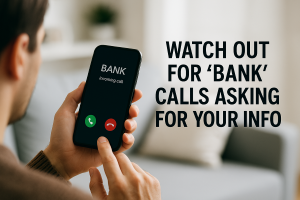A few years ago my husband received a phone call from someone claiming to be from our credit union fraud department. It was late at night, and I heard my husband talking so I went into the living room. I spoke to the person who kept saying that they needed to verify our information to be able to confirm the fraud. Finally I said that I am in cybersecurity, that I didn’t see anything improper showing on our account, and that I’ll call my credit union directly since I have the phone number memorized. The scammer hung up.
You too may get a call claiming there’s suspicious activity on your account. The caller sounds professional (like our scammer did) and claims to be from the fraud or security department. They will sometimes know your name and will ask you to “verify” details—like your account number, password, or even the one-time passcode (OTP) texted to your phone. They will say it’s urgent in order to prevent more fraud from occurring.
Here’s the danger: banks send OTPs to protect you, not to be shared. If someone calls and asks for that code or your banking details, it’s always a scam. By handing it over, you’re giving criminals the keys to your account.
How do you stay safe? Simple: hang up. Then call your bank using the number on the back of your card—not the one the caller gives you. Remember to also be careful in searching for phone numbers online. Be positive you are on your financial institution’s legitimate website.
Trust your instincts. If something feels off, it probably is. We could have lost all of our money that evening. It happens to many people every single day. Please don’t let it happen to you or your family.
